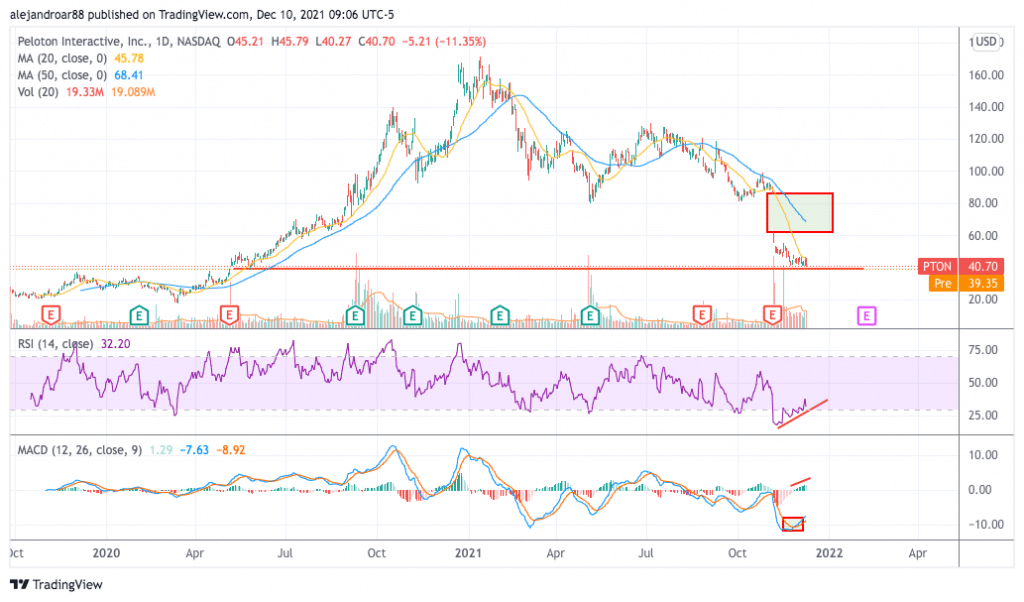Peloton Stock Down 8% in December – Time to Buy PTON Stock?
Please note that we are not authorised to provide any investment advice. The content on this page is for information purposes only.
The price of Peloton stock accumulates an 8% drop so far in December while shares are down more than 4% today in pre-market stock trading action as analysts’ downgrades continue to depress the valuation of the fitness company.
Last month, Peloton stock suffered a strong 52% drop following the release of its financial results covering the first quarter of its 2022 fiscal year. On 5 November, the company announced that it stopped hiring people while it also trimmed its forecasts for the fiscal year amid post-pandemic headwinds.
Consumers seem to be now going back to the gym rather than relying on Peloton’s at-home training devices and that is contributing to reducing the firm’s forecasted growth after a blockbuster 2021 fiscal year.
Meanwhile, in mid-November, the company announced that it was raising $1 billion in capital through the sale of Class A common shares along with another $150 million from underwriters who opt to exercise their 30-day options.
Even though the market initially reacted positively to the news, the downtrend resumed a day after as Peloton priced the shares at $46 apiece or 15% lower than the stock’s closing price on the day that the share sale announcement came out.
This morning’s pre-market decline along with yesterday’s pronounced 11% drop is pushing the price of Peloton stock to a crucial support area.
What can be expected from this fitness stock as we head into the end of the year? In this article, I’ll be assessing the price action and fundamentals of PTON stock to outline plausible scenarios for the future.
68% of all retail investor accounts lose money when trading CFDs with this provider.
Peloton Stock – Technical Analysis

Peloton stock is currently trading 76.2% below its 52-week high of $171.1 per share as the pandemic tailwind that once lifted the company’s valuation seems to have fully faded.
The company’s latest disappointing financial performance, a marked-down share offering, and negative news like this recent hiring freeze are contributing to this decline and have now pushed the price of PTON stock to tag a crucial support area at the $40 level.
That said, even though the price is dropping to a fresh 2021 low, momentum indicators are starting to show signs that the downtrend may have found a short-term bottom.
In this regard, the Relative Strength Index (RSI) is on an uptrend despite the price collapsing to lower lows while the MACD has just crossed above the signal line on the back of steadily increasing positive histogram readings.
This bullish divergence increases the odds that Peloton stock will at least slow down the pace at which it has declined lately as this wave of negative momentum seems to be losing steam.
If the price jumps above the 20-day simple moving average – currently standing at $46 per share – chances are that we will see Peloton stock jumping to the $60 or $70 level in the following weeks.
Whether this is a temporary pause in the downtrend or a full-blown trend reversal will be unclear until the price action crosses some of these thresholds. In that regard, the fundamental situation may be more enlightening to predict what the stock could do afterward.
Peloton Stock – Fundamental Analysis
Sales of Peloton were already growing fast before the pandemic started as they more than doubled every single year in 2018, 2019, and 2020.
However, growth is expected to slow down in this 2022 fiscal year as the management is forecasting a meager 20% jump in the firm’s top-line results at best.
In regards to this deceleration in its growth, Peloton’s management stated the following in a letter that accompanied the firm’s Q1 2022 earnings report:
“As discussed last quarter, we anticipated fiscal 2022 would be a very challenging year to forecast, given unusual year-ago comparisons, demand uncertainty amidst re-opening economies, and widely-reported supply chain constraints and commodity cost pressures”.
Investors seem to be struggling to determine if this deceleration can mean that the company has reached peak performance already or if this is the result of some short-lived headwinds.
For now, the market seems to have made its mind that Peloton will never deliver again the kind of growth that it did in previous years. This is reflected by the company’s valuation, as its forward P/S ratio has declined from around 12x back when Peloton IPOed to 2.7x right now.
From a fundamental perspective, the firm is now cheaper than it has ever been. However, it is important to note that Peloton burned around $650 million in cash during the first quarter of the 2022 fiscal year.
Even though its cash reserves are still quite ample at around $2 billion including the proceeds of this latest share sale, the company has to take drastic measures such as the hiring freeze it announced recently to remain afloat.
In that context, this decision is not necessarily bearish. It actually means that the management is taking the appropriate steps to keep its finances in shape.
Moving forward, it would be positive to see Peloton maturing toward becoming a profitable enterprise. That said, it is still too early to tell if that is what the future holds for the business or even what the management intends to do.
At this current valuation, and considering Peloton’s innovative business model, this bet is one that some may want to take considering that the company’s prospects remain promising amid its large and relatively untapped total addressable market.






